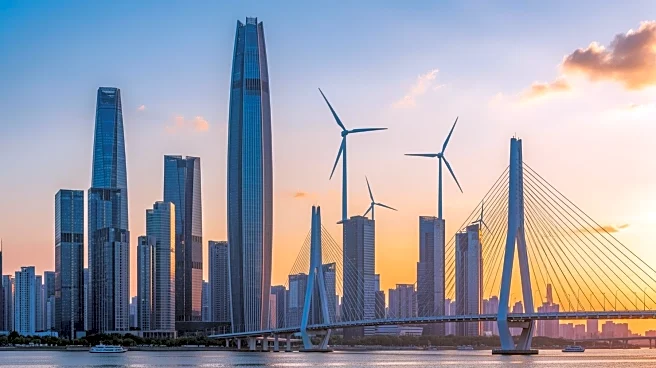What's Happening?
The New Development Bank (NDB) was officially launched in Shanghai, marking a new era in global development finance. Established by the BRICS countries, the NDB aims to mobilize resources for infrastructure and sustainable development projects in emerging
markets and developing countries. With an authorized capital base of $100 billion, the bank provides an additional pool of capital to fund infrastructure plans in BRICS nations. The NDB's creation is not intended to rival the World Bank and IMF but to complement the existing system of development finance. The bank emphasizes sustainability and clean energy, aiming to uphold the highest standards of governance and social safeguards.
Why It's Important?
The launch of the NDB represents a significant shift in the global financial landscape, offering an alternative to traditional Western-led institutions. By providing development funding to emerging economies, the bank promotes economic growth and development in regions that have been underserved by existing financial systems. The NDB's focus on infrastructure and sustainable development is crucial for addressing global challenges such as climate change and promoting environmental responsibility. The bank's emphasis on sustainability and clean energy may lead to more balanced and inclusive development policies, benefiting a wider range of countries.
What's Next?
As the NDB continues to grow, it may expand its membership and influence in the global financial system. The bank's focus on sustainable development and clean energy could drive innovation in project implementation, setting new standards for development finance. The NDB's efforts to reshape the global financial architecture may lead to increased cooperation among emerging economies, potentially influencing other multilateral development banks to adopt similar approaches.
Beyond the Headlines
The NDB's creation highlights the shifting dynamics in global development finance, with emerging economies taking a more active role in shaping the agenda. This could lead to a more balanced and inclusive international financial system, reducing reliance on traditional Western-led institutions. The bank's emphasis on sustainability and ESG impacts may also encourage other development banks to prioritize these factors, leading to more environmentally and socially responsible projects worldwide.















